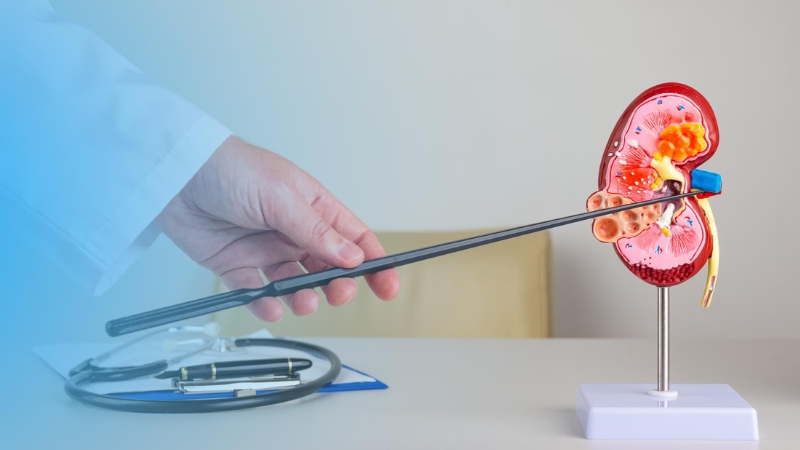Kidney Stone Treatment"Targeted Approaches for Relief and Prevention."

We provide complete care for people with kidney stones by offering expert Kidney Stone Treatment services at our medical center. Our treatment strategy is intended to be minimally intrusive, effective, and focused on promoting kidney health because we understand the impact that these stones can have on day-to-day functioning. This section will discuss the importance of kidney stone treatment, the conditions it treats, possible concerns, and the unique qualities that set us apart as a leading provider of first-rate care in this specialized area.
What Is Kidney Stone Treatment?
Treatment for kidney stones, which are hard deposits of minerals and salts that develop within the kidneys, entails either medical supervision or surgical surgery. Different methods may be required for the removal or disintegration of these stones due to their potential to cause pain, obstructions, and other issues.
Why Is Kidney Stone Treatment Essential?
- Recovery:Pain Management: When kidney stones restrict the urine tract, they can be quite painful. The goal of treatment is to lessen the pain and suffering brought on by stone passage.
- Preventing Complications: Complications from kidney stones may include blockages, kidney damage, or urinary tract infections. The goal of treatment is to control or avoid these side effects.
- Improving Urinary Flow: Bigger stones can cause discomfort and even difficulties by obstructing the urine's natural flow. The goal of treatment is to normalize urine flow.
- Preventing Stone Growth: In order to lessen the chance of a recurrence, treatment techniques include steps to stop the growth of current stones and the production of new ones.
Possible Risks:
Although kidney stone treatments are generally safe, there is a possibility of infection, bleeding, residual stone pieces, anesthetic reaction, and transient urine problems. Before recommending a particular course of therapy, healthcare professionals carefully weigh these risks and talk to patients about any potential problems.
Treatment Steps in Kidney Stone Treatment::
- Diagnosis: Imaging procedures, such as CT scans, ultrasounds, or X-rays, are the first steps towards an accurate diagnosis since they reveal the location, size, and composition of kidney stones.
- Pain Management: Quick action is done to address discomfort and agony. It may be necessary to give medication and more water to encourage the stones' natural transit.
- Conservative Management: Conservative management techniques are used for smaller stones. This can entail drinking more water, changing one's diet, and using drugs to help stones pass through naturally.
- Monitoring and Evaluation: Urine tests and imaging investigations are used to continuously monitor the condition of the stone passage, identify any difficulties, and evaluate its development.
- Minimally Invasive Procedures: Minimally invasive methods could be taken into consideration if stones do not pass naturally or if they are causing substantial symptoms. To break up or remove stones, these methods include ureteroscopy, shock wave lithotripsy (SWL), and percutaneous nephrolithotomy (PCNL).
- Surgical Intervention: When minimally invasive treatments are not appropriate or for bigger stones, surgical surgery may be advised. For the removal of stones, open surgery or laparoscopic methods are available.
- Post-Treatment Follow-Up: To guarantee that all stones have been removed and to keep an eye out for any potential issues, follow-up appointments are planned on a regular basis. To verify the efficacy of treatment, imaging studies may be conducted again.
- Preventive Measures: Patients are advised to take preventive steps to lower their chance of developing another stone after therapy. This could entail altering one's diet, drinking more water, and taking medicine to treat underlying illnesses that cause stones to form.
The course of therapy for kidney stones is a step-by-step process that is customized to the unique features of the stones and the general health of the patient. The selected course of treatment intends to successfully control symptoms, facilitate stone passage or removal, and avert problems. Constant monitoring will be conducted to guarantee favorable results.
Top Asked Questions and Answers:
FAQ (Frequently Asked Questions):
+91-9144411108
Emergency Cases

